Lemony Snicket’s A Series of Unfortunate Events
 for thematic elements, scary situations and brief language.
for thematic elements, scary situations and brief language.
Reviewed by: Brett Willis
STAFF WRITER
| Moral Rating: | Average |
| Moviemaking Quality: |
|
| Primary Audience: | Kids Family |
| Genre: | Adventure Comedy |
| Length: | 1 hr. 53 min. |
| Year of Release: | 2004 |
| USA Release: |
December 17, 2004 |
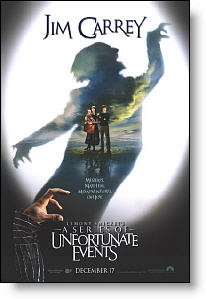
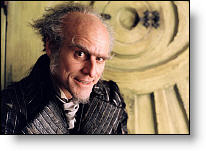
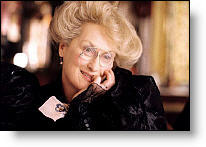
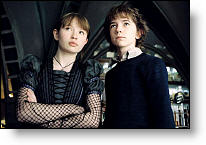
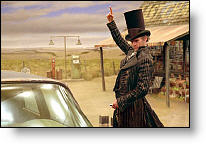
| Featuring |
|---|
| Jim Carrey, Meryl Streep, Emily Browning, Kara Hoffman, Liam Aiken |
| Director |
|
Brad Silberling |
| Producer |
| Albie Hecht, Laurie MacDonald, Walter F. Parkes, Julia Pistor |
| Distributor |
“This Holiday, Christmas Cheer takes a break.”
Here’s what the distributor says about their film: “This is the story of the Bauedelaires, three young orphans, Violet (Browning), Klaus (Aiken) and Sunny, looking for a new home, who are taken in by a series of odd relatives and other people, including Lemony Snicket, who narrates the film, and starting with the cunning and dastardly Count Olaf (Carrey), who hopes to snatch their inheritance from them. Violet is the oldest of the Baudelaires at 14, and is their brave and fast-thinking leader. The only boy is middle child Klaus, 12, who is intensely intelligent and obsessed with words. The youngest is infant Sunny, who speaks in a language only her siblings can understand, and she has a tendency to… bite.”
I sometimes wonder if writers and producers lie awake nights thinking up new ways to package their material, in order to keep the public confused on whether it’s “good” or “bad.” Other times, I don’t wonder; I’m certain of it.
This film is in a class by itself. I’ve researched other reviews and comments about it, both positive and negative, and I agree in principle with some points made by both sides. So I’m struggling, trying to be fair.
Since the film is based on three of the books in the Unfortunate Events series, and the first volume of that series has sold nearly 20 million copies and has been translated into 20 languages, there’s a large ready-and-waiting audience. Was it worth the wait?
In a fantasy world of dark, Gothic imagery, containing a mixture of 19th Century, 20th Century, 21st Century and purely imaginary technology, the three Baudelaire children—14 year old Violet (Emily Browning), 12 year old Klaus (Liam Aiken of “Good Boy”) and one year old Sunny (twins Kara and Shelby Hoffman)—are orphaned when a mysterious fire destroys their mansion and kills their parents. A relative, Count Olaf (Jim Carrey), becomes their guardian.

There’s no suspense in the overall plot. We know pretty much from the get-go that Olaf wants to kill the children, or do whatever else he needs to do, so he can get his grimy mitts on their fortune. And that he probably killed their parents, too.
There IS suspense within certain action scenes, such as when Olaf leaves the children locked inside a car, on the train tracks, with a train approaching. Or when Olaf suspends Sunny in a birdcage from a high tower, and threatens to drop her unless Violet marries him, which she does. Yup, you read that right. There are also snakes, leeches, rats, and a house collapsing into the ocean while the children are inside. And Olaf apparently murders the children’s Uncle Monty and their Aunt Josephine, both of whom are rivals for the guardianship. That’s a fair sampling of the frightening content. I’m sorry that it includes spoilers; but since this film is targeted at young children, parents need to know what they’re dealing with.
As far as HOW the material is presented… the PG rating is fair. Compared to the way this subject matter would be showcased in most films, it’s extremely restrained. For the most part, we’re given threatened or implied violence rather than actual, on-screen violence. But the thematic material is still there. And it consists of an exaggerated playout of many children’s worst fears. What if their parents died? Have adequate provisions been made for their welfare? If not, why not? How does anyone know that a child’s adoptive parents, foster parents or guardians will be kind and fair, will have their interests at heart and won’t take advantage of them? And if there IS a problem, and the children confide in other adults, what if no one believes them?
There’s a small amount of language; about a half-dozen profanities, including Olaf using the unusual expression “Jumped-up Jehovah.” Even the baby language of Sunny, which is translated in subtitles, includes a colorful reference or two.
The sexual content is also quite scarce, and some of it is designed to go over children’s heads. Or perhaps into their subconscious. While Olaf’s purpose for marrying Violet is the inheritance money (and the side benefit of getting her to cook and clean for him), any little girl of sufficient age should be deeply disturbed by the overtones of this idea. Also, Olaf pretends at one point to be interested in Aunt Josephine, and tosses a sly innuendo at her (again, his real interest is the money).
Where, amongst all this material, is the positive content that causes millions of kids to read these books? Actually, there’s quite a bit. The children are inventive and resourceful. They usually don’t complain about their circumstances, but just make the best of them (in one touching scene, they’re locked in a room by Olaf, and they make a tent in the middle of the room, huddle together, and find a way to cast shadows representing their parents watching over them). And they’re willing to sacrifice themselves for each other. In the world of this story, where God is not a factor and where even the “good” adults are “thick as a brick” and can’t be trusted, the children have to make their own way as best they can. Depending on how you approach it, that’s either a positive message of self-help and contentment, or a negative message of Humanism.
When I was a child (I don’t remember my exact age) and saw Disney’s “Pinocchio” in the theatre, I was extremely distraught by the scene where the disobedient little boys are playing pool, smoking cigars, drinking beer and talking smart, and suddenly they (as a result of their disobedience) begin to turn into donkeys. I knew that it was only a movie, and yet it was more disturbing than most films because I closely identified with the characters and their actions. What I fear is that …“Unfortunate Events” (not just one scene, but the entire film) may have a similar effect on today’s children, and that any positive lessons will be drowned in a sea of depression and fear. This depends of course on each child’s age, maturity and background. Remember, PG means Parental Guidance. If your children are interested in this film, I strongly encourage you to research as many conservative reviews on this film as you can, and make an informed decision.
Violence: Moderate / Profanity: Minor / Sex/Nudity: Minor


[Average/3]
That said, this was a fun movie. We enjoyed ourselves, the funny parts were funny, the frightening parts were not too frightening, and the situations the children encountered gave my daughter and I a lot of serious discussion openers for the ride home (it’s a secular movie, folks—you gotta do the spiritual application yourself). The cast was excellent, and even though I personally have always found Jim Carey to be an obnoxious, over-the-top, scene-stealing ham, this movie casts him in the *role* of an obnoxious, over-the-top, scene-stealing ham—so he’s perfect for it.
Troublesome points in an otherwise pleasant experience: One use of the Lord’s name in vain, and one brief, mild swear word (both by Carey). Such a pity the producers feel the need to insert this stuff.
Bottom line: Fun experience? Yes. See it again with my 8-year-old? Maybe. Take my *5*-year old to see it? No Way!! Polar Express for her.
[Better than Average/4]
[Better than Average/4]
[Better than Average/3]
[Good/3]
[Good/5]
The supposed wedding between Count Olaf and his niece, Violet 14, was probably the most disturbing, objectionable part of the movie. I don’t recommend it and doubt if I will be going to another of Mr. Carrey’s films for some time to come.
[Average/2½]
I saw some other viewers were uncomfortable with the marriage of the 14-year-old girl to Olaf. And I saw the rebuttal that it was clearly so he could gain their fortune. So when I watched the show I told myself that it was just for the money and not to be critical of that scene. When the scene came it still turned my stomach. My husband was disgusted by it. If Olaf had said something like “I’ll kill you before the hour is up” or something like that—then it would seem like he wasn’t intending to live as a married couple. But instead he tells her that she will massage his feet and clean his toe nails, etc. Anyhow, it was just all to real as in this world as recently another Christian Pakistani 14-year-old girl was kidnapped to be some older man’s “bride,” and in our Western culture they take these young girls in child trafficking. It’s just too much in an already dark movie.
My husband and I enjoy a lot of movies, including ones intended for children. This movie was a regret to watch.
Moral rating: Offensive / Moviemaking quality: 5
I was quite excited to see the movie! This movie is not a light, airy, happy, and joyful movie. It’s very dark.
When recommending movies, I tend to go to the more conservative side. There was some degrading humor and some scary bits to it. There was also a bit of violence as well. The idea of an adult getting married to a 14 year old bothered me as well.
It is an okay movie, but does not make my list of family friendly movies!
[Average/2]
[Extremely Offensive/1]
[Average/3½]
[Good/1½]
[Better than Average/1½]
I don’t feel that there was any sort of spiritual message in this movie. The Baudelaire orphans are very intelligent, likeable children, however everything happens to them exists in a moral void, and this, for me, caused the movie to be unwatchable. There is the sense of good triumphing over evil in the children getting away from their awful relative, Count Olaf, but this is lost in the interesting histrionics of Jim Carey.
Carey’s particular style of physical/vocal humor, which I usually find amusing when it isn’t too disgusting, just doesn’t work in this movie. He’s constantly upstaging everyone else in the movie until you wonder how stupid the children’s guardian is when that individual keeps putting them with the Count. He just doesn’t “fit” with the rest of the characters.
I also found the undertones of violence disturbing in a movie made for children. Yes, most of the apparently murderous mayhem occurs off-screen, but the menace of it colors the entire movie. This style of menace is appropriate for, say a Hitchcockian-style movie, however not for a children’s movie.
I do understand the younger set likes these books a lot, probably because the orphans seem to be able to handle almost anything in their out-of-control world, thus striking a chord in the younger reader by making them feel empowered in a world over which they have little control. However, I believe that of the darker irony that adolescents and adults may find humorous is not appropriate for children’s books. Personally, I wouldn’t read the books to a child under the age of eight or nine, or take anyone under the age of 11 to see the movie. Everything about this particular fictional world feels Victorian / Dickensian in style without Dicken’s moral redemption of basically rotten situations.
If your children have read the books and really want to see the movie, wait until it’s out on VHS/DVD. You won’t get the gorgeous feel of the cinematography, etc. as well on the small screen, however the movie probably won’t be as overwhelming for the smaller ones.
[Average/1½]
[Very Offensive/3]
The acting was wonderful by all involved. There are many classic quotes in this movie which keep me laughing. It was very funny and well thought out. Though not perfectly accurate to the books, it was close enough that the book’s fans should not be to dissapointed. I was very impressed by the actors they chose. All of the Baudilaires were great actors, and I hope to see some of their other movies. And most of the other cast was great.
From a Christain perspective, I do not find much offensive in this movie. I would say anyone old enough to read the books and comprehend them is old enough to see this movie. But this is a dark movie. Their are not many “Happy scenes” in this movie except for a cheesy scene at the end. I love this movie, and I was definitely not dissapointed. I would recommend this to everyone.
[Good/5]
[Good/5]
[Good/4½]
[Extremely Offensive/1]
[Better than Average/3]
[Extremely Offensive/1]
[Better than Average/2]
[Good/4½]
[Better than Average/4½]
[Good/5]
[Better than Average/3½]
[Average/3½]
[Good/4½]
[Good/5]
[Good/4½]
[Excellent/5]
[Better than Average/5]
[Excellent/12]
[Better than Average/4½]
[Excellent!/4½]
The story does tend to jump form one scene to another quite quickly and at some points I found myself thinking the events to be a little random. but morally speaking there is nothing terrible or dark about this fiml other than count Olaf.(the bad guy) But really, almost every movie has some villain, so this one doesn’t strike me as being any different. The character of Olaf is actually far scarrier in the book series than in the film.
[Better than Average/3]

The exaggerated characters and situations translate very well to how children see things—overblown and dramatic. The loss of a parent, a divorce, and having no control over the situations you find yourself in are common to every little boy and girl. Here we see the Baudelaires in much the same predicament. Rather than sitting back and allowing it to happen, they take charge and learn to build a “safe little place in a threatening world.”
Ultimately the message is that you must fight for your rights, that you’re not completely helpless, that good ultimately triumphs over evil, and most of all, that although the world has many bad people in it, there are also many good people. Some may feel the film is too dark but I found the events and ending conclusion worth any morbidity. If you read and enjoyed the books, or are simply looking for an intelligent and slightly off the wall children’s film, you’ll find yourself engrossed in the world of Lemony Snicket.
My Ratings: [Good/4½]